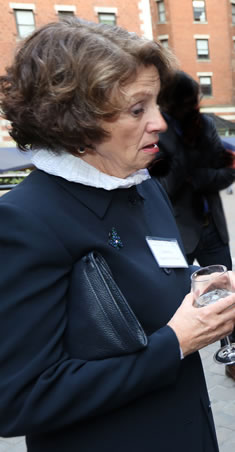BOOK REVIEW:
Seeking Alice, a novel by Camilla Trinchieri
Reviewed by Dr. Joan Baum, Ph.D.
 Seeking Alice
Seeking Alice
A novel by Camilla Trinchieri
(SUNY Press, Excelsior editions), 224 pp., $19.95.
Key words in the title of this absorbing narrative about the devastations of war on love are “a novel,” because the dedication, “In Memoriam,” alludes to what the story itself seems to evoke, a sense that this moving fictional narrative has a strong basis in reality. If so, it nonetheless shows what good fiction can often do that memoirs and autobiographies cannot: rise above historical facts to enunciate a theme that extends beyond the particular time and place, here central Europe in the early forties. The book’s epigraph would suggest as much. It’s from William Faulkner - “Memory believes before knowing remembers,” a gnomic statement that might mean that the heart knows instinctively what evidence only later affirms, the point being, as it is for the central character in Seeking Alice, that deep and abiding bonds never die and may in fact contradict reports of the death of a loved one.
Susie, the oldest of Alice’s three children, opens the novel with a first-person narration set in Cambridge, MA. It’s 1956. She’s happily married and is expecting her first child, but she’s forever haunted by nightmares and faint memories of being in Prague, then Italy, with her beloved mother, Alice, or Alinka as she was called by her husband and friends. “Mama has come back into my head. I need her, want her here to guide me.” But as far as Susie knows and as her younger brother insists, their mother is dead, a victim of the war, shot on Christmas Eve as she pushed Susie and her baby sister Claire through a wire fence in Nazi-infested Italy to safety in Switzerland in 1943. Before that, though, as Susie remembers, Alice was dying in another way, mentally, emotionally, incarcerated in an institution in Rome and given shock therapy. Susie’s brother, Andy, a talented frail musician, had been spirited away to safety in Spain by their father. Papa was an Italian diplomat, the Vice Consul, during the Fascist and Nazi regimes.
Switch to a first-person narration by Mama, October 1941. Alice is pregnant (with Claire) and is still “awash in peace, happiness,” but as much as Alice adores her handsome husband Marco, she despises the Nazis and the Fascists, particularly when, like Reinhard Heydrich, they come visiting their home in Prague. It’s still early in war, but, as Alice says, “Before Prague I didn’t know `Jew’ in any language.” Her husband makes apologies for his position and wants her to conform. He’s anxious about protecting them, especially after America enters the war. This political difference infects their relationship, despite fervent sexual passion between them and a genuine shared love of their children. But as events grow more dire, with bombings and hardships, Alice becomes unhinged and wants out, out of Prague, Rome, Europe. They lived for a while in the States (in Newport). She wants to get back. Marco says he cannot leave his post and protect them. He’s often away anyway, and at least on one occasion, is discovered by Alice to have been having an affair. She may be a bit willing to forgive him for that but not for the wider deception: “He has deceived me, deceived his children, and by wearing a Fascist uniform only for personal convenience, he has ended up deceiving even those faceless men who died in Russia and Africa.” She feels herself becoming a different person.” Wartime is woman’s time. Blame it on the war.” At one point she makes Susie write 100 times: “I am an American.”
It was a clever move, stylistically divide the narrative into alternating streams of consciousness of mother and child, both seeing similar events with some differences though the basic facts remain. The war is finally over and Susie is in Cambridge, awaiting the birth of her child. But what happened to Alice? Papa never talked about her and the children have only their dreams. Andy is convinced Alice is dead, and yet finds slips of paper after Papa dies, that show him paying sums of money to nuns in Rome. Intuitively, without reason or cause, Susie determines to seek Alice, to find out what happened after that Christmas Eve when she and Claire were pushed into Switzerland. Suspense builds, and Trinchieri drives toward her conclusion with skill and heart.#
